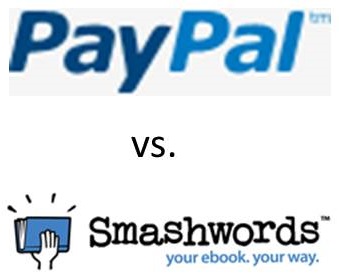Recall the brouhaha in February and March 2012 between PayPal and Smashwords? It’s been a year and a half since then; time for a retrospective look.
 It started when PayPal told Smashwords to remove all content referring to bestiality, rape, and incest from its website or else its customers could no longer buy books using PayPal. The problem for PayPal was that it was backed by major credit card companies; all of whom had reputations to uphold. They couldn’t be seen as permitting, let alone advocating, what many customers saw as smut.
It started when PayPal told Smashwords to remove all content referring to bestiality, rape, and incest from its website or else its customers could no longer buy books using PayPal. The problem for PayPal was that it was backed by major credit card companies; all of whom had reputations to uphold. They couldn’t be seen as permitting, let alone advocating, what many customers saw as smut.
That put Smashwords in a real bind. PayPal wasn’t just a means for paying for books on the site; it was integral to the site. Accordingly, Smashwords notified all its authors of the change in policy and engaged in negotiations with PayPal. The negotiations got into the minutiae of defining bestiality, rape, and incest.
Meanwhile a funny thing happened. People reacted. In a big way. The internet backlash campaign against PayPal rose up with the power and immediacy of a tidal wave. By the thousands, people signed petitions, wrote angry blog rants, and cancelled their PayPal accounts; whole organizations formed to fight this one issue.
By mid-March it was over. PayPal reversed its stance.
So, problem solved, right? We can all move on?
Not really. Just a couple of weeks ago, the British bookseller W.H. Smith shut down its website due to a problem involving pornographic books. Using the search term ‘daddy,’ like a child might do, resulted in some book choices that were, let’s say, inappropriate for children.
So the fight continues and will likely go on as long as there are books, and people. Each side in this war has a valid point and a principle worth defending. One side seeks to keep adult-themed books out of the reach of minors. Failure, as they see it, leads to moral decay and the collapse of civil society. The other side strives to defend freedom of expression. Failure, to them, leads to book-burning and thought control.
The boundaries of what’s acceptable have been shifting for centuries, even millennia. What is appropriate for children? To what lengths shall we go to protect them? These questions are ageless.
What’s new today is the explosion of adult interest in pornographic books, the ease of electronic searches for books, and the fact that children are often more adept with the internet than their parents.
I don’t bring this up because I have some magic answer, nor am I taking sides. I’ve written one story that young children shouldn’t read, and that’s “Blood in the River” in the horror anthology Dead Bait. I’m trusting parents not to purchase a book of horror stories for their toddlers. So far I haven’t written anything else that could be described as erotic or pornographic. If I do, I’ll publish it under another name.
My point is only that this ain’t over. Battle lines will shift; skirmishes will erupt at the borders of the eternal culture conflict; periods of peaceful equilibrium will end with further clashes and uprisings.
For me, the danger lies at both extreme ends of the spectrum. I think there should be a way for parents to protect their young children from exposure to porn (and parents need to define that term ‘porn’ for themselves). Similarly, I don’t want society (especially the government) to ban porn for adults.
That’s my take on the books of the shadows. What’s yours? Leave a comment and let your views be known to the world and to—
Poseidon’s Scribe
